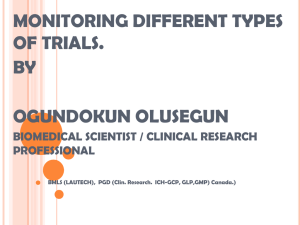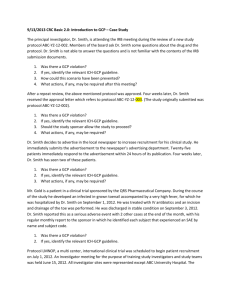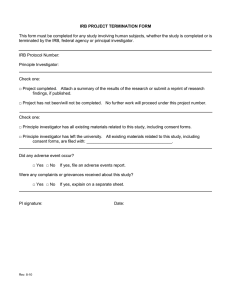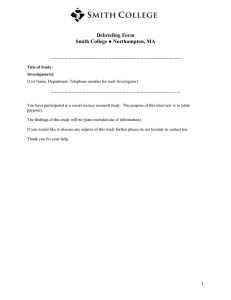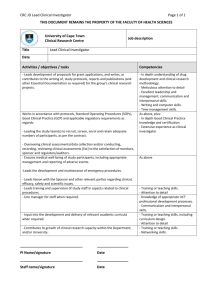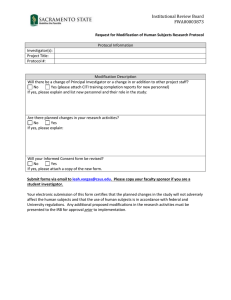International Conference on Harmonization (ICH) Good Clinical Practices (GCP), Applicability to Human Subjects Research
advertisement
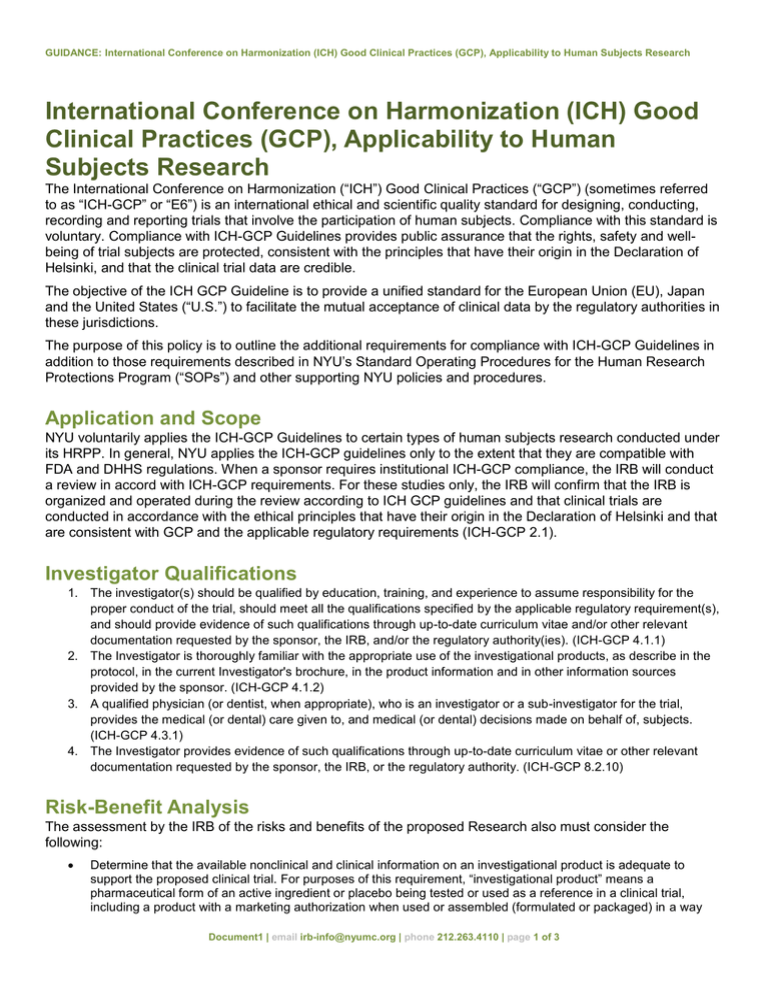
GUIDANCE: International Conference on Harmonization (ICH) Good Clinical Practices (GCP), Applicability to Human Subjects Research International Conference on Harmonization (ICH) Good Clinical Practices (GCP), Applicability to Human Subjects Research The International Conference on Harmonization (“ICH”) Good Clinical Practices (“GCP”) (sometimes referred to as “ICH-GCP” or “E6”) is an international ethical and scientific quality standard for designing, conducting, recording and reporting trials that involve the participation of human subjects. Compliance with this standard is voluntary. Compliance with ICH-GCP Guidelines provides public assurance that the rights, safety and wellbeing of trial subjects are protected, consistent with the principles that have their origin in the Declaration of Helsinki, and that the clinical trial data are credible. The objective of the ICH GCP Guideline is to provide a unified standard for the European Union (EU), Japan and the United States (“U.S.”) to facilitate the mutual acceptance of clinical data by the regulatory authorities in these jurisdictions. The purpose of this policy is to outline the additional requirements for compliance with ICH-GCP Guidelines in addition to those requirements described in NYU’s Standard Operating Procedures for the Human Research Protections Program (“SOPs”) and other supporting NYU policies and procedures. Application and Scope NYU voluntarily applies the ICH-GCP Guidelines to certain types of human subjects research conducted under its HRPP. In general, NYU applies the ICH-GCP guidelines only to the extent that they are compatible with FDA and DHHS regulations. When a sponsor requires institutional ICH-GCP compliance, the IRB will conduct a review in accord with ICH-GCP requirements. For these studies only, the IRB will confirm that the IRB is organized and operated during the review according to ICH GCP guidelines and that clinical trials are conducted in accordance with the ethical principles that have their origin in the Declaration of Helsinki and that are consistent with GCP and the applicable regulatory requirements (ICH-GCP 2.1). Investigator Qualifications 1. The investigator(s) should be qualified by education, training, and experience to assume responsibility for the proper conduct of the trial, should meet all the qualifications specified by the applicable regulatory requirement(s), and should provide evidence of such qualifications through up-to-date curriculum vitae and/or other relevant documentation requested by the sponsor, the IRB, and/or the regulatory authority(ies). (ICH-GCP 4.1.1) 2. The Investigator is thoroughly familiar with the appropriate use of the investigational products, as describe in the protocol, in the current Investigator's brochure, in the product information and in other information sources provided by the sponsor. (ICH-GCP 4.1.2) 3. A qualified physician (or dentist, when appropriate), who is an investigator or a sub-investigator for the trial, provides the medical (or dental) care given to, and medical (or dental) decisions made on behalf of, subjects. (ICH-GCP 4.3.1) 4. The Investigator provides evidence of such qualifications through up-to-date curriculum vitae or other relevant documentation requested by the sponsor, the IRB, or the regulatory authority. (ICH-GCP 8.2.10) Risk-Benefit Analysis The assessment by the IRB of the risks and benefits of the proposed Research also must consider the following: Determine that the available nonclinical and clinical information on an investigational product is adequate to support the proposed clinical trial. For purposes of this requirement, “investigational product” means a pharmaceutical form of an active ingredient or placebo being tested or used as a reference in a clinical trial, including a product with a marketing authorization when used or assembled (formulated or packaged) in a way Document1 | email irb-info@nyumc.org | phone 212.263.4110 | page 1 of 3 GUIDANCE: International Conference on Harmonization (ICH) Good Clinical Practices (GCP), Applicability to Human Subjects Research different from the approved form, or when used for an unapproved indication, or when used to gain further information about an approved use (ICH-GCP (E6) 1.33 and 2.4); and Ensure that clinical trials are scientifically sound and described in a clear, detailed Protocol (ICH-GCP (E6) 2.5). See also NYU SOPs, Section 3.7.1.1 for non-ICH-GCP requirements. Basic Elements of Informed Consent Investigators and research staff provide all the disclosures and follow the requirements pertaining to consent covered by ICH-GCP. To be valid under ICH-GCP requirements, consent disclosures must provide the following additional elements of information to potential subjects (in addition to the elements described in NYU’s SOP, Section 5.5): For alternative procedures or treatment that may be available to the subject, include their important potential benefits and risks. (ICH-GCP 4.8.10 (i)) That the monitor, the auditor, the IRB, and the regulatory authority will be granted direct access to the subject’s original medical records for verification of clinical trial procedures or data, without violating the confidentiality of the subject, to the extent permitted by the applicable laws and regulations and that, by signing a written consent form, the subject or the subject’s legally acceptable representative is authorizing such access. (ICH-GCP 4.8.10 (n)) Vulnerable Populations When adults are unable to consent, the IRB shall determine: A non-therapeutic clinical trial (i.e. a trial in which there is no anticipated direct clinical benefit to the subject) should be conducted in subjects who personally give consent and who sign and date the written consent document. (ICH-GCP 4.8.13) Non-therapeutic clinical trials may be conducted in subjects with consent of a legally acceptable representative provided the following conditions are fulfilled (ICH-GCP 4.8.14): o o o o o o The objectives of the clinical trial cannot be met by means of a trial in subjects who can give consent personally. The foreseeable risks to the subjects are low. The negative impact on the subject’s wellbeing is minimized and low. The clinical trial is not prohibited by law. The opinion of the IRBs is expressly sought on the inclusion of such subjects and the written opinion covers this aspect. Such trials, unless an exception is justified, should be conducted in patients having a disease or condition for which the investigational product is intended. Subjects in these trials should be particularly closely monitored and should be withdrawn if they appear to be unduly distressed. Investigator Responsibilities In order to satisfy the ICH-GCP requirements, Investigators who conduct Research involving Human Subjects must satisfy the additional elements (in addition to the requirements set forth in NYU SOPs contained at Section 12.4): 1. During and following a subject’s participation in a trial, Investigator ensure that adequate medical care is provided to a subject for any adverse events, including clinically significant laboratory values, related to the clinical trial. (ICH-GCP 4.3.2) 2. The Investigator informs a subject when medical care is needed for other illnesses of which the Investigator becomes aware. (ICH-GCP 4.3.2) 3. The Investigator follows the trial's randomization procedures, if any, and ensures that the code is broken only in accordance with the Protocol. If the trial is blinded, the Investigator promptly documents and explains to the sponsor any premature unblinding. (ICH-GCP 4.7) 4. When appropriate, the Investigator informs the subject’s primary physician about the subject’s participation in the clinical trial if the subject has a primary physician and if the subject agrees to the primary physician being informed. (ICH-GCP 4.3.2) Document1 | email irb-info@nyumc.org | phone 212.263.4110 | page 2 of 3 GUIDANCE: International Conference on Harmonization (ICH) Good Clinical Practices (GCP), Applicability to Human Subjects Research 5. Although a subject is not obliged to give his or her reasons for withdrawing prematurely from the clinical trial, the Investigator should make a reasonable effort to ascertain the reason, while fully respecting the subject’s rights. (ICH-GCP 4.3.4) 6. Where allowed or required, the investigator may assign some or all duties for investigational articles accountability at the trial sites to an appropriate pharmacist or another appropriate individual who is under the supervision of the investigator. (ICH-GCP 4.6.2) 7. The investigator, pharmacist, or other designated individual will maintain records of the product's delivery to the trial site, the inventory at the site, the use by each subjects, and the return to the sponsor or alternative disposition of unused products. These records will include dates, quantities, batch/serial numbers, expiration dates (if applicable), and the unique code numbers assigned to the investigational products and trial subjects. Investigators should maintain records that document adequately that the subjects are provided the doses specified by the protocol and reconcile all investigational products received from the sponsor. (ICH-GCP 4.6.3) 8. The Investigator permits monitoring and auditing by the sponsor, and inspection by the appropriate regulatory authority. (ICH-GCP 4.1.4) 9. The Investigator ensures the accuracy, completeness, legibility, and timeliness of the data reports to the sponsor. (ICH-GCP 4.9.1) 10. The investigator reports all serious adverse events (SAEs) to the sponsor except for those SAEs that the protocol or other document (e.g., investigator’s brochure) identifies as not needing immediate reporting. The investigator follows regulatory requirements related to the reporting of unexpected serious adverse drug reactions to the regulatory authority and the IRB. (ICH-GCP 4.11.1) 11. The investigator provides written reports to the sponsor, the IRB, and, where applicable, the university on any changes significantly affecting the conduct of the clinical trial or increasing the risk to subjects. 12. The investigator maintains the clinical trial documents as specified in Essential Documents for the Conduct of a Clinical Trial and as required by the applicable regulatory requirements. (ICH-GCP 4.9.4) 13. Essential documents are retained until at least two years after the last approval of a marketing application in an ICH region and until there are no pending or contemplated marketing applications in an ICH region or at least two years have elapsed since the formal discontinuation of clinical development of the investigational product. (ICHGCP 4.9.5) 14. If the Investigator terminates or suspends a clinical trial without prior agreement of the sponsor, the Investigator informs the institution, sponsor, and the IRB. (ICH-GCP 4.12.1) 15. If the IRB terminates or suspends its approval of the clinical trial, the investigator should promptly notify the sponsor. (ICH-GCP 4.12.3) 16. Upon completion of the trial, the investigator informs the IRB with a summary of the trial’s outcome, and the regulatory authority with any reports required. (ICH-GCP 4.13) 17. The Investigator maintains a list of appropriately qualified persons to whom the Investigator has delegated significant trial-related duties. (ICH-GCP 4.1.5) 18. For reports of deaths, the Investigator supplies the sponsor and the IRB with any additional requested information (e.g. autopsy reports and terminal medical reports). (ICH-GCP 4.11.3) Related Policies NYU Human Research Protection Program Standard Operating Procedures Related Law & Regulations International Conference on Harmonisation of Technical Requirements for Registration of Pharmaceuticals for Human Use, Guideline for Good Clinical Practice -E6 Document1 | email irb-info@nyumc.org | phone 212.263.4110 | page 3 of 3
